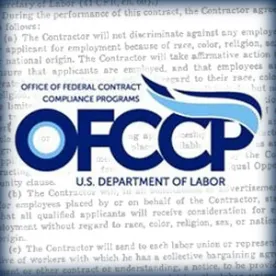On August 25, the Department of Labor’s Office of Federal Contract Compliance Programs (OFCCP) announced an updated Scheduling Letter and Itemized Listing that places a more onerous information disclosure burden on federal contractors in responding to a Supply and Service compliance audit. In particular the updated Scheduling Letter, OMB No. 1250-0003, now requires federal contractors to produce more documentation for a variety of Items and increases both the scope and breadth of requested compensation data.
Additional Documentation Required
The updated Scheduling Letter includes a number of revised and new Items as follows:
-
Federal Regulations require federal contractors to create action-oriented programs to address problem areas identified for the preceding AAP year. Item 7 of the updated Scheduling Letter now requires contractors to provide documentation demonstrating the development and execution of those action-oriented plans.
-
Revised Items 8 and 12 now requires that contractors provide documentation indicating whether their efforts to recruit individuals with disabilities and veterans were effective. If ineffective, contractors must provide detailed documentation describing their actions to identify and implement alternative efforts.
-
Item 11 now requires contractors to conduct the utilization analysis designated in the Federal Regulations to evaluate the representation of individuals with disabilities in the workforce. If the analysis identifies any underutilization, contractors must provide a description of the steps take to determine whether and where impediments to equal employment opportunity exists.
-
Revised Item 18(c) now requires documentation that includes established policies and descriptions of practices related to promotions. And, for each job group or title, contractors must provide the total number of promotions by gender and race/ethnicity.
-
New Item 21 requires that federal contractors provide documentation of policies, practices, or systems used to recruit, screen, and hire applicants, including the use of A.I., algorithms, automated systems, or other technology-based selection procedures.
-
New Item 24 requires that federal contractors provide copies of EEO policies, including antiharassment policies, EEO complaint procedures, and employment agreements that impact EEO rights and complaint processes.
-
Federal Regulations require federal contractors to conduct assessments of their personnel processes. Item 25 now requires contractors to include, as part of that assessment, any impediments to equal employment opportunity identified through the assessment and any actions taken as a result of the assessment.
Increased Scope and Breadth of Compensation Data
-
Item 19 requests employee level compensation data for all employees as of the date of the workforce analysis, and as of the date of the prior year’s workforce analysis. This requirement increases the burden on federal contractors as Item 19 now requires two years of individual compensation data instead of one. Additionally, contractors now need to provide the base salary and other compensation paid to each employee, relevant data on the factors used to determine employee compensation, and policies related to the contractor’s compensation factors. This additional data places an emphasis on employees’ total compensation and provides the OFCCP with additional information to evaluate the potential causes of any potential compensation disparities.
-
Finally, new Item 22 requests that contractors provide documentation that they have satisfied their obligation to evaluate compensation systems to determine whether there are any gender, race, or ethnicity-based disparities. Contractors will need to produce documentation showing when the compensation analysis was completed, the number of employees included, the number and categories of employees excluded, which forms of compensation were analyzed, that compensation was analyzed by gender, race, and ethnicity, and the method of analysis.
Key Takeaways
The updates to the Scheduling Letter will place a more onerous burden on federal contractors to respond to a compliance audit, and unless an employer prepares in advance, they may not have enough time to compile all of this information in the typical 30-day deadline contained in the Scheduling Letter. As a result, all contractors, but particularly those contractors on the Corporate Scheduling Announcement List (CSAL), should work with counsel as soon as possible to start gathering and preparing responses. And even outside of the audit context, contractors should engage counsel to ensure their practices align with the OFCCP’s expectations related to the type of documentation needed to demonstrate compliance. As repeatedly stated by the OFCCP (and more broadly the Biden Administration), compensation is of particular focus for the OFCCP and, not coincidentally, the area in which OFCCP tends to extract a significant portion of its settlement values.






 />i
/>i

